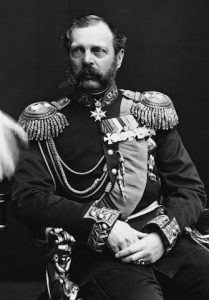Week 18
 Alexander II (born: April 29, 1818; died March 13. 1881, Tsar 1855-1881) was the Emperor of Russia, King of Poland and Grand Duke of Finland from 2 March 1855 until his assassination. Alexander's most significant reform as emperor was emancipation of Russia's serfs in 1861, for which he is known as Alexander the Liberator. The tsar was responsible for other reforms, including reorganizing the judicial system, setting up elected local judges, abolishing corporal punishment, promoting local self-government through the zemstvo system, imposing universal military service, ending some privileges of the nobility, and promoting university education. After an assassination attempt in 1866, Alexander adopted a somewhat more reactionary stance until his death. The photo at left is taken when Tsar Alexander was in his 60s.
Alexander II (born: April 29, 1818; died March 13. 1881, Tsar 1855-1881) was the Emperor of Russia, King of Poland and Grand Duke of Finland from 2 March 1855 until his assassination. Alexander's most significant reform as emperor was emancipation of Russia's serfs in 1861, for which he is known as Alexander the Liberator. The tsar was responsible for other reforms, including reorganizing the judicial system, setting up elected local judges, abolishing corporal punishment, promoting local self-government through the zemstvo system, imposing universal military service, ending some privileges of the nobility, and promoting university education. After an assassination attempt in 1866, Alexander adopted a somewhat more reactionary stance until his death. The photo at left is taken when Tsar Alexander was in his 60s.
In addition to Alexander II we will spend some time on the very great novel by Ivan Turgenev, Fathers and Sons. The novel is a perfect summary of the transition taking place in Russian society at the middle of the 19th century, both in the imperial family and within Russian society. Turgenev tells the story of two young men in their twenties, university men, who come home to visit their parents, their old-fashioned parents, and during the visit, Turgenev shows us Russia in the midst of this huge mid-century change. The book is set at the very moment of the Liberation of the Serfs by Tsar Alexander II.
REQUIRED READING
RECOMMENDED READING

Hugh Small,
The Crimean War: Queen Victoria's War with the Russian Tsars,
Tempus Publishing, Limited (March 1, 2014),
ISBN 0752443887
